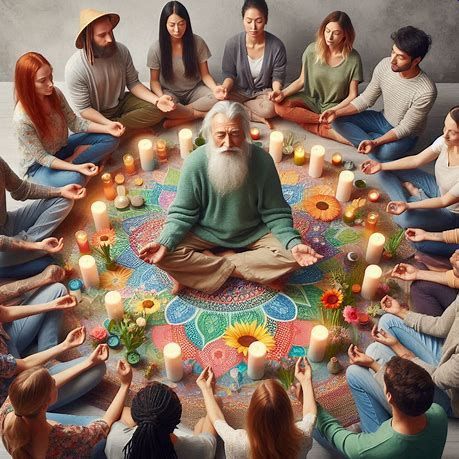The government creates godmen, destroys values, in pursuit of power and wealth
RN Bhaskar
Last week the police finally registered an FIR (First Information Report, a document which must be prepared before criminal investigations begin) against priest and ‘godman’ Yati Narsinghanand (https://indianexpress.com/article/cities/delhi/yati-detained-bjp-mla-adds-fuel-says-temple-attacked-calls-for-encounter-9605727/). He is the controversial head priest of the Dasna Devi temple in Uttar Pradesh’s Ghaziabad. This is not the first time an FIR has been filed against a priest or godman, and it is certainly not the first time that criminal charges have been filed against such people. Yet, despite all this, there is growing unease at the way the government handles cases against priests, godmen, religious leaders, and builders of temples. All this contributes massively to poor governance.
Temples
To understand how duplicitous the stance of governments has been (both the current government and those before it) one has only to study the Supreme Court judgement (Writ Petition (Civil) No 354 of 2006 of 16 December 2015 — https://asiaconverge.com/2016/04/courting-god-the-supreme-court-attempts-to-rescue-indias-temples/). A copy of the judgement was originally available at *http://judis.nic.in/supremecourt/imgs1.aspx?filename=41133, but itis not accessible lately. It can, however, be got from https://indiankanoon.org/doc/196164116/. It can also be downloaded from 2014-01-06-Supreme Court of India_judgement-Chadambaram temple case
The case was about the right of the state government (Tamil Nadu) to take over the management and control of the trusts, which run the Chidambaram (Natraja) Temple, one of the most respected and venerated in India. The trust also had a large corpus of money which does attract the attention of politicians.
After several adverse judgements and delays by lower courts, the matter finally reached the Supreme Court. The judgement clearly laid down the following principles:
- no government has the absolute right to take over the management of temple trusts. By implication it was also stating that the government takeover of temple trusts of Shirdi, Siddhivinayak, Vaishnodevi and even Tirupati were patently illegal and could be challenged. Yet, even after this judgement, the current government has tried to meddle with, and even take over the management of temples, some successfully, others abortive (https://indianexpress.com/article/cities/delhi/yati-detained-bjp-mla-adds-fuel-says-temple-attacked-calls-for-encounter-9605727/).
- Article 26 of the Constitution confers certain fundamental rights upon the citizens which can neither be taken away nor abridged.
- Even if the management of a temple is taken over to remedy the evil (of any alleged mismanagement), the management must be handed over to the person concerned immediately after the evil stands remedied. Continuation thereafter would tantamount to usurpation of their proprietary rights or violation of the fundamental rights guaranteed by the Constitution in favour of the persons deprived. “Therefore, taking over of the management in such circumstances must be for a limited period… Supersession of rights of administration cannot be of a permanent enduring nature.”
Eventually, the temple, said the court, is built with the funds of devotees. They alone have the right to govern temples, and not politicians or governments. Even if there is one “podu Dikshitar” (the priests who set up the temple and perform the daily rituals at temples) they have more rights than the government to manage the temples and the funds.
Incidentally, temple trusts have been known to run schools, universities and charity homes, far more efficiently than what is being done today, after government takeover of temples.
Public pronouncements and practice
Ironically, both the RSS (reportedly the larges NGO in the world and which is a key driving force behind the BJP, the ruling party at the centre) and the Bharatiya Janata Party (BJP) have made public pronouncements against governments meddling with temples and temple trusts.
In 1959, the RSS passed the first resolution urging the Uttar Pradesh government “to take steps to return this (Kashi Vishwanath) temple to the Hindus”. The resolution noted that the “tendency of the government to establish its control and monopoly, directly or indirectly, over the various spheres of life is becoming more and more pronounced over the last few years”.
Even in 1988 the Akhil Bharatiya Karyakari Mandal (ABKM) of the RSS called upon the “various state governments to respond to the legitimate demand of the Hindu society and hand over the temples to the right representatives of Hindu devotees”. The ABKM resolution said government control over temples was “unfair, unjust and discriminatory”, and alleged that “governments are taking over temples with an eye on their enormous funds”.
In 2023, at an election rally in Telangana last year, Prime Minister Modi accused the Tamil Nadu government of taking over Hindu temples.
But public pronouncements are one thing. The desire for control of temple trusts is a great temptation for governments — both at the centre and the states – because
- they offer access to the huge wealth they collect annually from devotees, and
- access to huge vote banks.
Governments are known to give out properties owned by temples to favoured private parties at highly discounted prices, using the funds to promote government schemes, and bringing in politicians to key events, so that they can thus gain access to captive vote banks.
Lure of money and power
Temples have invariably been the place where money (usually in the form of gold) used to be kept. This money belonged both to temple trusts (from devotees) and to merchants who treated temples as quasi banks (free subscription — https://bhaskarr.substack.com/p/how-south-india-bankrupted-the-roman).
That was the key reason why invaders attacked temples. It was not hatred towards religion, but a desire to loot the temple treasuries. That also explains why a Hindu group from the Maratha camp, attached to Maratha chief Raghunath Rao ‘Dada’ Kurundwadkar, looted and desecrated Sringeri. It was a Muslim king, Tipu Sultan, who in 1791, rescued Sringeri and decreed that Hindus and Muslims should live in harmony (https://www.deccanchronicle.com/151113/nation-current-affairs/article/tipu-sultan-protected-sringeri-math-kalkuni-vittal-hegde).
The lust for money and power explains why even this government tried to take over – in 2019 — the Uttarakhand Char Dham temples and 49 other temples. Huge public protests made the attempt unsuccessful.
Even today, cases against the laws enacted by the TN government allowing it to manage temple trusts and temples continue to be fought in various courts, with more successes than failures. Many of these details can be found at TR Ramesh’s website at https://sangamtalks.org/t-r-ramesh/ . He is President of the Temple Worshippers Society. He coordinates the legal efforts concerning Pujya Swami Dayananda Saraswati Swami’s Case before the Supreme Court filed against the control of Hindu Temples & Charities in the States of Tamil Nadu, Andhra Pradesh and Puducherry.
Godmen
The same greed for money and power is what encourages politicians and political parties to cultivate, promote and even exploit godmen.
This is not peculiar to the present government. People still recall the roles of Dhirendra Brahmachari (“The flying guru” — https://thepatriot.in/profile/dhirendra-brahmachari-the-rise-and-fall-of-indias-first-celebrity-yoga-guru-51372) and Chandraswamy (https://economictimes.indiatimes.com/news/politics-and-nation/chandraswami-the-rise-and-fall-of-a-high-flyer/articleshow/58811428.cms). There is also the case of Agnivesh (https://indianexpress.com/article/india/swami-agnivesh-passes-away-6592319/) who strode through the corridors of Parliament in saffron robes as an elected representative even though conventions forbade the mixture of religion and politics.
The relationship between godmen and the government has become more pronounced in recent years.
The close relationship between the ruling party at the Hindutva movement encouraged the presence of saffron clad ‘sadhus’ at public event. But what is interesting is that the key seers of Hinduism – heads of the four mathas or peeths (or centres) established by Adi Sankara (https://www.jagranjosh.com/general-knowledge/list-of-shankaracharyas-in-india-1705584092-1) were seldom invited to promote Hinduism. The four maths are
- Badrikashram Jyotirpeeth in the north,
- Dwarka’s Shardha Peeth in the west,
- Govardhan Peetha in Puri in the east, and
- Sringeri Sharada Peetham in the South
By keeping the most respected voices from mainstream Hinduism away, the vacuum was swiftly filled by self-styled godmen. As I had written in 2016 (https://asiaconverge.com/2016/04/sri-sri-baba-ramdev-hinduism-produce-godmen-faiths/) “mainstream religious heads get marginalised. And in the resultant vacuum, politicians prop up other ‘godmen’ and allow them the freedom to use their devotees’ contributions the way they want. Politicians have a vested interest in doing this. The godmen attract followers. And the followers are persuaded to vote for a particular party. Thus, politically propped up godmen grow in stature and in collections (in percentage terms) than mainstream holy men (who refuse to call themselves godmen).” The Hindus, thus, end up creating more godmen than any other religion in the world.
Almost all the godmen have FIRs registered against them – for land-grab, for rape, and even murder.
Take the case of Nityanand, a self-styled godman. He has criminal charges against him (https://www.deccanchronicle.com/nation/crime/190220/arrest-warrant-issued-against-godman-nithyananda.html), but manages to flee the country. He even claims to have established his own country. No charges of treason have been brought against him. The government goes after wealth generators, but not against godmen.
Two of the godmen who were charged and then convicted are Asaram (https://www.newindianexpress.com/nation/2024/Aug/27/ailing-rape-convict-asaram-bapu-leaves-for-treatment-in-pune-after-serving-11-years-at-jodhpur-central-jail) and Ram Rahim (https://asiaconverge.com/2017/09/should-governments-be-promoting-religion/).
Yet, because both godmen have a large following, state governments and the courts have granted leave to both convicts time and again, to be released for limited periods (https://mybigplunge.com/news/justice-in-question-controversial-parole-grants-amidst-national-outrage-over-kolkata-doctors-case/). Is it a coincidence that these releases take place just before elections?
The Supreme Court’s silence
Strangely, the Supreme Court has not taken suo moto cognizance of such affronts to legal processes and convictions.
Even in the much reported Bilkis Bano case which took place in 2022( https://www.thehindu.com/news/national/bilkis-bano-case-sc-rejects-gujarat-governments-plea-seeking-review-of-verdict-over-certain-observations/article68686301.ece), the state government of Gujarat chose to release the convicts before their term had expired in 2022. It took several court battles, and two years for the Supreme Court to pass scathing remarks in January 2024, about the alacrity shown by the Gujarat government to “usurp” Maharashtra’s authority in deciding on the remission. The trial in the case was held in Maharashtra, which was the competent authority to decide the remission applications of the 11 convicts.
What was shocking was the Gujarat state government’s decision to cur short the prison terms of these convicts on the grounds of “good behaviour”. One Gujarat elected representative had the gall to say (https://www.ndtv.com/india-news/bilkis-banos-rapists-are-brahmins-have-good-sanskar-bjp-mla-3266193) “They were Brahmins and Brahmins are known to have good sanskaar. It might have been someone’s ill intention to corner and punish them.” The religion card was on display once again
Serious consequences
When courts do not strike down promptly acts which fly in the face of law, and which are patently malafide in public perception, the edifice of law itself begins to crumble.
The entire legal and constitutional structure is in danger of collapsing. This is especially when
- governments decide to meddle with religion, instead of leaving the decisions relating to community matters to the heads of respective religions, and intervene only when there is a principle of law that has been violated. All religions are based on values. When these values get debased, there is chaos ahead;
- courts do not make the Chidambaram judgement an overriding law for the entire country – why should each temple have to fight a battle against government takeovers and meddling?
- governments try to marginalise the mainstream voices of religion, and prop up surrogates who style themselves as godmen. The reluctance to prosecute godmen for landgrab, charges for rape and murder are quite evident;
- governments protect and encourage the building of temples and shrines instead of schools and colleges (https://www.livemint.com/Opinion/ZXd6OysrQLMe5s2gERVhOO/India-has-more-places-of-worship-than-schools-or-colleges.html). Each temple is often viewed as a money-making exercise. Roads and pavements are encroached upon, and courts remain silent spectators;
- politicians make big speeches about protecting girls and women, yet allow rapists and murders to be released for “good behaviour” and grant them repeated paroles especially when elections draw close.
India is thus in danger of losing all semblance of values and governance if the basic rules of punishing the guilty, and preventing rapes, murders and loot of public property are allowed to be corroded.
India deserves much more.
============================
Do watch my latest podcast on Census for Humans at https://www.youtube.com/watch?v=-qOhIhZneZE
============================================





































COMMENTS